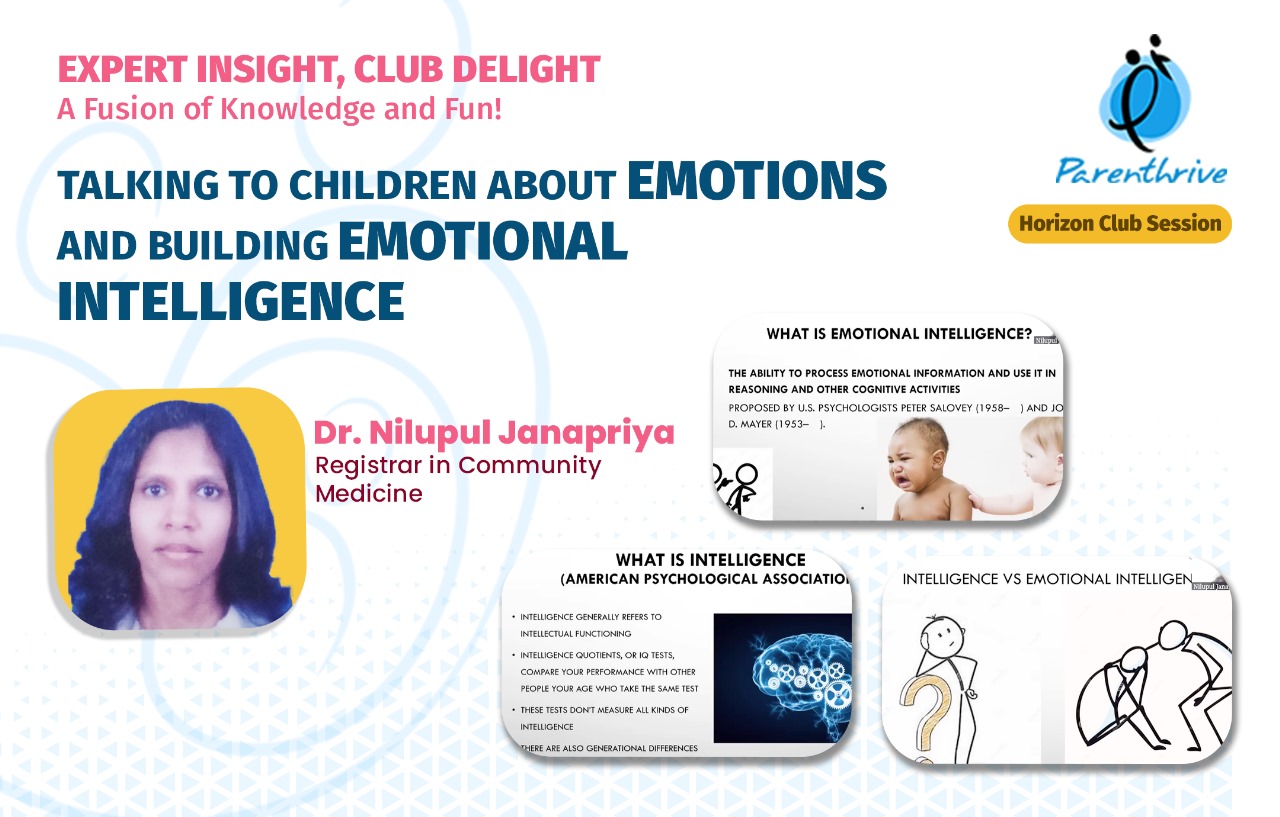
On Saturday, October 12th, Parenthrive hosted an enlightening session on helping children navigate the world of emotions, led by Dr. Nilupul Janapriya. This session was tailored for parents eager to foster healthy emotional development in their children, equipping them with tools to understand, express, and manage their emotions effectively.
Dr. Janapriya delved into the core concepts of emotional intelligence (EI), a critical skill that helps both children and adults handle emotional information, make informed decisions, and maintain strong interpersonal relationships. EI, as described, is the ability to manage one's emotions and understand the emotions of others, a concept that is vital in today's complex emotional landscape.
What is Emotional Intelligence?
Emotional intelligence refers to the ability to recognize and process emotions and utilize this emotional awareness in reasoning and cognitive functions. As defined by psychologists Peter Salovey and John D. Mayer, emotional intelligence involves understanding, using, and managing emotions to foster personal and social well-being. This involves being aware of one's own emotional state while also being attuned to the emotions of others, thus building empathy and emotional rapport.
Key Elements of Emotional Intelligence
Dr. Janapriya emphasized five key elements of emotional intelligence that parents should focus on when guiding their children:
- Self-Awareness: The foundation of emotional intelligence is understanding one's emotions. This involves recognizing emotions as they arise and understanding their impact on ourselves and those around us. Children who develop self-awareness are better equipped to manage their moods and reactions, setting the stage for emotional control and empathy.
- Self-Regulation: Emotional control is essential to not letting emotions dictate our actions. Teaching children how to manage their emotions without suppressing or overindulging them fosters resilience. Dr. Janapriya introduced the Marshmallow Test, a classic study demonstrating how impulse control in young children correlates with future success. Parents can guide their children in developing patience, emotional self-control, and decision-making skills.
- Self-Motivation: Drive and perseverance are key components of emotional intelligence. Children who can channel their emotions to stay motivated during challenging situations tend to excel in various aspects of life. Dr. Janapriya discussed how optimism and emotional resilience contribute to high performance, even under stress, encouraging parents to nurture an optimistic mindset in their children.
- Empathy: Empathy allows individuals to understand and connect with others on a deeper level. Dr. Janapriya highlighted that empathy is built on self-awareness. The more we understand our own emotions, the better we can read and respond to the emotions of others. Teaching children to see situations from others' perspectives is key to developing social skills and forming meaningful relationships.
- Social Skills: Managing emotions in social settings is another crucial aspect of emotional intelligence. Dr. Janapriya shared how interpersonal intelligence enables us to handle relationships effectively. This involves understanding social dynamics, navigating conflict with empathy, and fostering positive connections with others. Encouraging children to develop strong communication skills and maintain emotional authenticity is essential in this regard.
Building Emotional Intelligence in Children
Dr. Janapriya offered several practical strategies for parents to help their children develop emotional intelligence:
- Model Positive Behavior: Children learn by observing the adults around them. By modeling calm, empathetic, and emotionally regulated behavior, parents can set a positive example.
- Encourage Self-Expression: Providing children with a safe space to express their feelings helps them develop emotional literacy. Encouraging them to name their emotions and discuss them openly fosters emotional awareness.
- Teach Problem-Solving Skills: Instead of fixing every problem for them, guide children in solving their own challenges. This builds resilience and confidence in their ability to navigate difficult situations.
- Mindfulness and Emotional Regulation Techniques: Dr. Janapriya also introduced mindfulness practices like meditation, deep breathing, and journaling as ways to help children become more in tune with their emotions. These techniques promote emotional regulation and help children process feelings in a healthy manner.
Howard Gardner’s Theory of Multiple Intelligences
In addition to emotional intelligence, Dr. Janapriya touched on Howard Gardner's Theory of Multiple Intelligences, which suggests that intelligence is not one-dimensional but exists in various forms, including linguistic, logical-mathematical, spatial, and interpersonal intelligence. Understanding these different types of intelligence allows parents to appreciate their children's unique strengths and guide them toward emotional and intellectual development.
Dr. Nilupul Janapriya’s session was a comprehensive guide to building emotional intelligence in children. By fostering self-awareness, empathy, and social skills, parents can help their children navigate the emotional complexities of life with confidence and resilience. Emotional intelligence is not only crucial for personal growth but also for building meaningful connections and achieving success in various spheres of life.
As Dr. Janapriya concluded, “By equipping children with emotional intelligence, we prepare them for a future where they can handle challenges with grace, form strong relationships, and maintain emotional well-being.”
For parents looking to cultivate a strong emotional foundation for their children, this session offered invaluable insights into how to guide them through the emotional landscape with empathy and wisdom.






